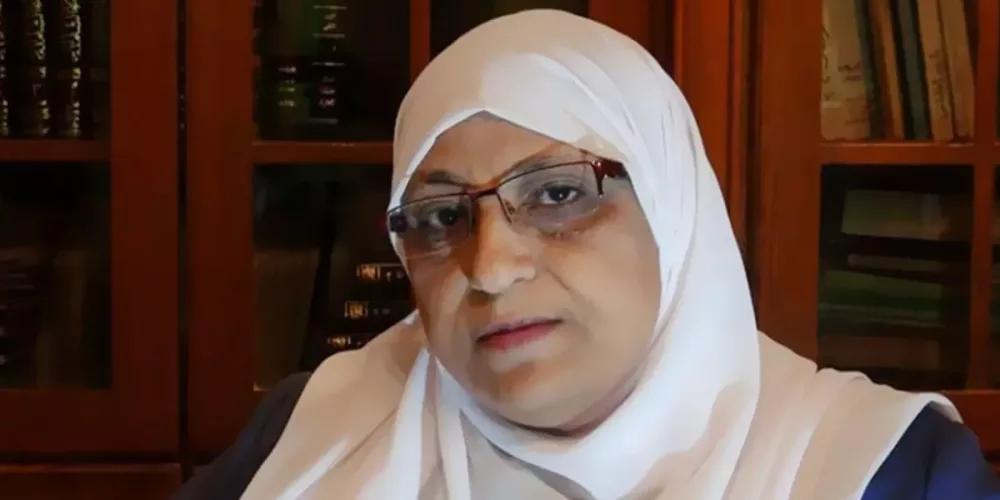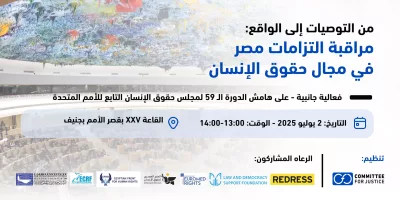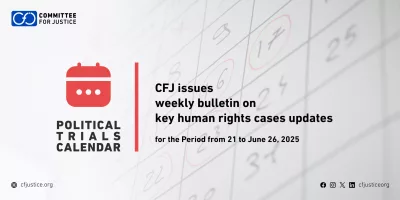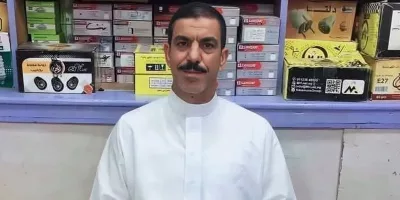The “Committee for Justice” stated that it is following with deep concern and condemnation the continued systematic violations perpetrated by the Egyptian authorities against lawyer, human rights defender, and former member of the National Council for Human Rights in Egypt, Huda Abd El-Moneim, which starkly exemplify the legal arbitrariness and systematic restrictive practices faced by women human rights defenders in Egypt.
Recently, Abd El-Moneim was referred to the Criminal Court in Case No. 800 of 2019 on charges identical to those for which she was previously prosecuted and served a five-year sentence. This action raises serious questions about the Egyptian authorities’ commitment to adhering to both domestic and international laws. It also reflects a systematic pattern of exploiting the law to silence dissenting voices and human rights defenders.
CFJ considers the retrial of Huda Abd El-Moneim on charges for which she has already been convicted to be a flagrant violation of the principles of justice. This decision follows a series of unlawful practices against her over the past five years, including her arbitrary arrest in Case No. 1552 of 2018, being subjected to further investigations just one day before the end of her sentence, and her placement in pretrial detention under Case No. 730 of 2020. These actions make her a victim of what is known as “recycling detention,” a tactic used by Egyptian authorities to keep political detainees and human rights activists in indefinite detention without clear legal grounds.
CFJ emphasizes that such practices lack any legal or ethical basis and are employed as repressive tools to prolong arbitrary detention, in clear violation of human rights protected by international covenants, including the International Covenant on Civil and Political Rights. These violations demonstrate how pretrial detention and the judiciary are systematically used in Egypt to suppress independent human rights voices and close the public space for civic engagement.
On a humanitarian level, CFJ highlights serious concerns regarding Abd El-Moneim’s deteriorating health condition. During her prolonged detention, she has suffered from severe health issues, including atrophy of her left kidney, recurrent blood clots, severe knee arthritis, chronic respiratory problems, and persistent middle ear infections. All this has occurred in the absence of adequate medical care. These practices constitute not only gross medical neglect but also amount to psychological and physical torture, as she is left to endure pain and health deterioration deliberately aimed at weakening her resolve and forcing her to abandon her human rights advocacy.
CFJ affirms its continued monitoring of Abd El-Moneim’s case and has engaged with several UN human rights mechanisms, including the Special Rapporteur on Human Rights Defenders and the United Nations Working Group on Arbitrary Detention. In 2021, the Working Group issued a clear legal opinion stating that Abd El-Moneim’s detention is arbitrary and unlawful. The group identified three categories of violations in her case: the absence of a legal basis for her arrest, deprivation resulting from the exercise of her fundamental rights, and the lack of fair trial guarantees. It also recommended her immediate and unconditional release, compensation for the psychological and material harm she endured, and an independent investigation into the circumstances of her arbitrary detention.
Despite these UN recommendations, the Egyptian authorities have taken no steps to implement them, reflecting a deliberate disregard for international obligations and an ongoing repressive approach aimed at restricting fundamental freedoms and closing civic spaces. This indifference represents not only a violation of Abd El-Moneim’s rights but also a severe threat to all human rights defenders in Egypt who face arbitrary detention, legal recycling, and systematic medical neglect.
Amid these practices CFJ calls on the Egyptian authorities to immediately and unconditionally release Huda Abd El-Moneim, ensure she receives necessary medical care, and halt all forms of recycling detention against her and other human rights defenders. The committee also demands transparent and independent investigations into all violations she has suffered, including her arbitrary detention and medical neglect, and holds accountable those responsible for these abuses.
CFJ further urges the international community, human rights organizations, and UN mechanisms to continue exerting pressure on the Egyptian authorities to fulfill their international human rights commitments and ensure accountability for rights violations. It underscores the importance of international solidarity with human rights defenders in Egypt, who are facing escalating repression aimed at silencing them and preventing them from carrying out their legitimate advocacy work.
Huda Abd El-Moneim’s case is not merely an individual issue but a reflection of the deteriorating human rights situation in Egypt. The persistence of such violations without accountability poses a serious threat to civil society and to the fundamental rights and freedoms guaranteed by national constitutions and international agreements. Finally, CFJ reiterates call for the Egyptian authorities to cease these repressive policies, open the public space for civil dialogue, and commit to the principles of justice and the rule of law.






